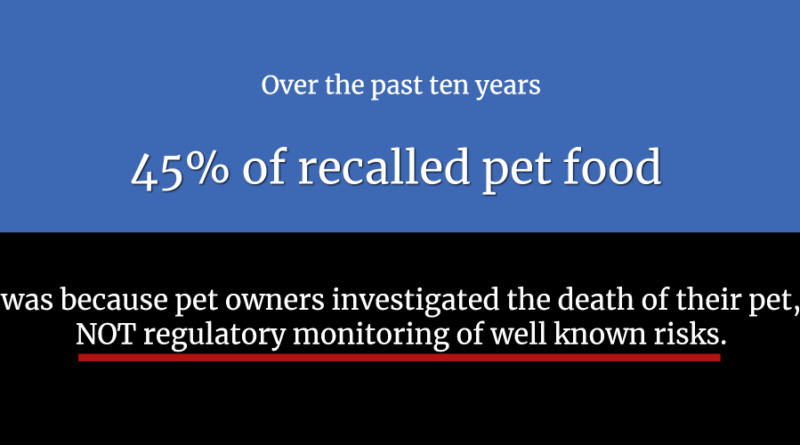What Do 10 Years of Recalls Tell Us? – Truth about Pet Food
[ad_1]
In the past ten years (January 2012 – October 2021), more than 327 million pounds of pet food has been recalled. That is similar to the weight of 91,000 Sport Utility vehicles.
The causes of recalls and pounds within each category are highlighted in the graphic below.

The worst year for recalls was 2013 with 125 million pounds of pet food recalled. The very next year – 2014 – we saw the least amount of pet food recalled with only 227,805 pounds recalled.
How can the pounds of pet food recalled vary so dramatically in two years? Because pet owners are at the mercy of regulatory discretion with recalls, with the exceptions of pet owners forcing regulatory to take action (via test results). Pet owners are given no guarantee regulatory authorities will investigate a potential issue with a pet food (through a consumer complaint), and even if an issue is investigated there is no guarantee the pet food will be recalled. As example…
An FDA notice published in 2016 stated: “During 2012, CVM received approximately three consumer complaints per month associated with Nestle Purina Beneful dry dog food. In January 2013, CVM received a surge of consumer complaints that occurred after a media report implicated Beneful dry dog food as a potentially harmful dog food product.” Because the agency received “a surge of consumer complaints” regarding Beneful, FDA investigated three Purina manufacturing plants. The FDA investigation stated the agency found no direct cause for the many pet illness complaints, but the agency did find: samples of Beneful contained ethoxyquin (a preservative) that was not disclosed on the label, formula and ingredient changes that were not disclosed on the label, and six samples of Beneful tested (by FDA) contained “above the allowable level for cyanuric acid and ammelide” (melamine – the cause of the deadly 2007 recalls). Any of these issues could have resulted in a recall, but…the FDA Center for Veterinary Medicine decided to “provide educational outreach to Nestle Purina Corporate Headquarters” instead. “CVM elected not to pursue regulatory actions during this incident.”
Over the past 10 years the causes of recalls were:
#1: Pathogenic Bacteria
The number one cause of pet food recalls was pathogenic bacteria. Almost 49% of all pet food recalls over the past ten years was for pathogenic bacteria, more than 159 million pounds have been recalled. And while the FDA and CDC continually warn pet owners to the risks of pathogenic bacteria in raw pet foods, raw pet foods were only 1.2% of the total in this segment. Kibble on the other hand – which FDA has never warned pet owners to the risks of pathogenic bacteria – is 98% of this segment.
Of the brands that were recalled for pathogenic bacteria, the then owned by Procter & Gamble Natura brand was responsible for 75% of the recalled pet foods, more than 120 million pounds.
Even though kibble pet foods were responsible for 98% of this category, kibble pet foods were only recalled for pathogenic bacteria in 6 of the last 10 years.
| 2012 | 24,691,821 pounds |
| 2013 | 125,010,454 pounds |
| 2014 | 177,061 pounds |
| 2015 | 69,504 pounds |
| 2016 | 0 pounds |
| 2017 | 0 pounds |
| 2018 | 0 pounds |
| 2019 | 0 pounds |
| 2020 | 4,320 pounds |
| 2021 | 7,567,499 pounds |
After a VERY bad 2012 and 2013, kibble recalls gradually decreased down to zero for four years. Why was there such a dramatic difference in the last ten years? This can perhaps be explained by another type of regulatory discretion…
The FDA used to have a compliance policy specific to kibble pet food – “CPG Sec. 690.700 Salmonella Contamination of Dry Dog Food”. This policy stated (bold added):
“In a case involving salmonellosis diagnosed in a mother, daughter and the family dog, the Milwaukee Health Department traced the cause to a dry dog food, and a recall resulted. Following the recall, CVM initiated an abbreviated inspection and analytical survey of a representative number of manufacturers of finished dry dog food products to explore an industry claim that it is an impossibility to manufacture this type of product without Salmonella contamination.“
This Compliance Policy disappeared from the FDA website in July of 2013. By coincidence, this FDA Compliance Policy – that made a very incriminating statement regarding kibble pet food – disappeared from the FDA website AFTER the Agency had multiple meetings with pet food industry representatives:
- February 2013, FDA CVM Director Bernadette Dunham met with multiple representatives of Purina Pet Care.
- Also in February 2013, FDA CVM Director Bernadette Dunham met with multiple representatives of the Pet Food Institute.
- In June of 2013, FDA CVM Director Bernadette Dunham met again with multiple representatives of Purina Pet Care.
- And in June of 2013, FDA CVM Director Bernadette Dunham met with multiple representatives of the National Grain and Feed Association (whose members include pet food manufacturers).
One month after the last meeting with the pet food industry, FDA withdrew the incriminating Compliance Policy. But, the meetings with FDA continued…
Representatives of kibble pet food manufacturers continued to meet with FDA in 2013 and early 2014. In January 2014, representatives from Purina, Mars, P&G and the Pet Food Institute met with FDA regarding “FDA’s zero tolerance policy for Salmonella in pet food.”
And by coincidence, kibble pet food recalled for pathogenic bacteria went down to zero for four consecutive years AFTER these pet food industry meetings with FDA.
#2 Pentobarbital
The second leading cause of pet food recalls is pentobarbital, a drug used to euthanize animals. More than 91 million pounds of pet food – all canned – has been recalled because they contained a euthanized animal. All 91 million pounds were recalled because of the actions of two pet owners, not regulatory monitoring.
In early 2017, a pet owner in Washington State experienced all five of her dogs becoming serious ill almost immediately after eating a pet food (Evangers Hunk of Beef canned dog food). One did not survive. This pet owner made a future changing decision to have a necropsy performed on her dog, which found the euthanizing drug pentobarbital within the dog food in the dog’s stomach. The necropsy results were provided to FDA and a recall followed. After the Evangers recall, a (pet owning) television station journalist in Washington DC decided to test 62 cans of various brands of dog food and found pentobarbital in 9 cans (manufactured by Smuckers). Those lab results were provided to FDA too, which resulted in more recalls. Because of the actions of these two people – not regulatory oversight – more than 91 million pounds of dangerous pet foods were removed from store shelves.
In 2018 the director of FDA Center for Veterinary Medicine gave a speech to industry stating “New evidence is showing that it may be a much more pervasive problem throughout the animal food supply than originally thought, and we have reason to believe rendered products can be a source for pentobarbital, if not controlled.” Despite this concerning disclosure to industry, the FDA has never warned pet owners of the risk of pentobarbital in rendered ingredients or announced a pet food monitoring plan to prevent the deadly contamination from happening.
And pentobarbital contamination in pet food did happen again, however this time the FDA did not force a recall. In April 2018 an inspection was performed at the ingredient supplier that provided pentobarbital contaminated fat discovered in a previous recall. During the inspection regulatory discovered the contaminated fat ingredient was sent to another brand – Champion Pet Food. Even though the investigation learned that pentobarbital contaminated pet food “was further distributed to the store/consumer level”, the FDA did not insist Champion recall the products.
#3 Aflatoxin
The third leading cause of pet food recalls over the past ten years was for deadly aflatoxin contamination; more than 60 million pounds of pet food were recalled, all were kibble pet foods. More than 99% of of the aflatoxin recalls occurred in 2021 and the last four months of 2020. The other less than 1% occurred in 2013.
Aflatoxin is a mycotoxin, mycoctoxins are molds prone to grain ingredients. Corn is very susceptible to mold, especially feed grade/pet food grade corn. And corn is the #1 most commonly used ingredient in pet foods, 700,000 tons more corn is used in pet food than any other ingredient. Human foods cannot contain any level of aflatoxin, but pet food is allowed to contain a maximum of 20 parts per billion. One kernel of aflatoxin contaminated corn in 5 pounds “could result in more than 20 ppb aflatoxin.”
The manufacturer that recalled the most pet food for aflatoxin contamination was Midwestern Pet Food with more than 58 million pounds recalled, 96% of all aflatoxin recalled pet food.
And again, the largest majority of pet food recalled for aflatoxin (all of the Midwestern Pet Food recalls) was discovered by pet owners, not regulatory oversight of pet food. Pet owners with sick pets tested the Midwestern Pet Foods and found extremely high (deadly) levels of aflatoxin. Those results were provided to regulatory officials and recalls followed. The FDA did issue a Warning Letter to Midwestern Pet food, however it wasn’t issued until seven months AFTER the recalls.
Consumers sent a letter to FDA Center for Veterinary Medicine in February 2021 requesting the agency properly monitor the pet food industry for deadly mycotoxins (the third leading cause of recalls), but the agency failed to respond to or even acknowledge our request.
#4 Excess or Insufficient Vitamins and/or Minerals
The forth leading cause of pet food recalls over the past ten years was due to the products containing an excess level or insufficient level of vitamins or minerals. More than 13 million pounds of pet food has been recalled for this manufacturing failure. The largest majority of this recall category was in canned pet food – 92%.
The manufacturer with the largest portion of this recall cause – 81% – is Hill’s Pet Food with an estimated ten million pounds for excess vitamin D recalls in 2019. (The FDA Enforcement Report Database was never updated to provide quantity of pet food recalled for the Hill’s excess vitamin D recalls. We asked FDA for the product total recalled, they responded: “The overall total was 1,445,202 cases.“)
#5 Foreign Object
In the past ten years, more than 1.7 million pounds of pet food has been recalled because of a foreign object being included in the product. 98% of the recalls in this category were canned pet food.
The manufacturer with the largest portion of this recall cause – 96% – is Mars Petcare with more than 1.6 million pounds recalled.
#6 Mold
In the past ten years, more than 167 thousand pounds of pet food has been recalled for containing mold. The majority of those recalls – 69% – were from an Iams (owned at the time by Procter & Gamble) in a topper product (Iams Shakeables).
#7 Excess Thyroid Gland
All of the recalls in this category – 254 thousand pounds of pet food – were from two recalls from two manufacturers (Wellness and Blue Buffalo) announced on the same day, March 17, 2017.
The totals:

The most startling statistic of all…
More than 149 million pounds of pet food recalled over the past ten years – 45% – was ONLY recalled because pet owners investigated, tested, and proved to regulatory authorities why their pets died. FDA didn’t discover these issues, state regulatory authorities didn’t discover these issues. Pet owners did.
All of the pentobarbital recalls and the majority of the aflatoxin recalls were directly due to pet owners. They had necropsies performed, they tested pet foods. And then they turned over their test results to regulatory authorities, forcing them to investigate the brands which finally led to recalls. Without their actions, 149 million pounds of pet food could have remained on store shelves sickening or killing thousands of pets waiting for regulatory to properly monitor pet food.
The FDA Center for Veterinary Medicine should be ashamed of this statistic. Pet owners are encouraged to report this statistic to their elected officials, demanding they investigate the FDA’s methods of regulating pet food.
If your pet becomes ill or dies you believe is caused by a pet food, please report it to FDA (each incident needs to become officially recorded by FDA) – but, don’t hesitate to take matters into your own hands too. Dr. Laurie Coger can help pet owners with testing of pet foods, she can be contacted Here. Should your pet die you believe is linked to a pet food, a necropsy could give you the evidence you would need to hold the manufacturer accountable and possibly save the lives of thousands of other pets. As the past ten years has exampled, we can’t always count on regulatory authorities to protect our pets.
Wishing you and your pet(s) the best,
Susan Thixton
Pet Food Safety Advocate
Author Buyer Beware, Co-Author Dinner PAWsible
TruthaboutPetFood.com
Association for Truth in Pet Food

Become a member of our pet food consumer Association. Association for Truth in Pet Food is a stakeholder organization representing the voice of pet food consumers at AAFCO and with FDA. Your membership helps representatives attend meetings and voice consumer concerns with regulatory authorities. Click Here to learn more.
What’s in Your Pet’s Food?
Is your dog or cat eating risk ingredients? Chinese imports? Petsumer Report tells the ‘rest of the story’ on over 5,000 cat foods, dog foods, and pet treats. 30 Day Satisfaction Guarantee. Click Here to preview Petsumer Report. www.PetsumerReport.com
Find Healthy Pet Foods in Your Area Click Here

The 2021 List
Susan’s List of pet foods trusted to give her own pets. Click Here to learn more.
[ad_2]
Source link





indian pharmacy online https://indianpharmacy.shop/# – reputable indian pharmacies indianpharmacy.shop
1win kg [url=https://1win6010.ru]https://1win6010.ru[/url] .